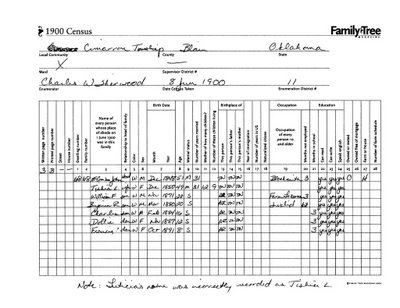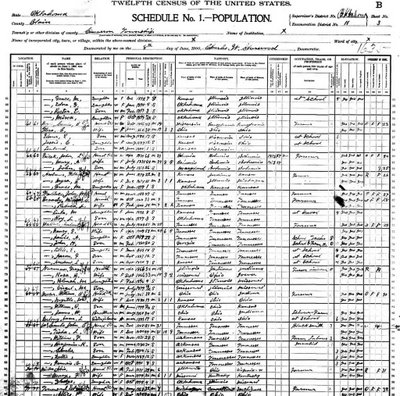Transcribing and Studying Census Records


Here is a sample of a 1900 census and my transcription of it. There are several places you can go for census forms. There are a few good reasons to transcribe the census records you find, although I also like to keep a copy of the original too. One way you can use this form is at the library or Family History Center where you can view microfilm. If you don't absolutely have to have a copy of the original you can transcribe the information you find to save the cost of copies. I like to have the original, so I only transcribe the family I am researching. However, if you are not going to have a copy of the original then you may want to transcribe the families that are their neighbors. You may find in the future their neighbors may marry into the family.
Another really good reason to transcribe your census records are to catch the details. Sometimes when I am looking through the census records I may not pay attention to all of the little details, just the important ones. But when you transcribe your census records you pay more attention to all of the details, and you might actually notice something that you may have otherwise ignored. That little detail any tell you something about your ancestor's life.
Also hopefully your own writing is easier to read then the census, so when you go back to it in the future you can quickly and easily understand what is in the census information. Many times the originals are so old that they didn't scan very clearly for the microfilm and they really are hard to read. Also they are shrunk down in size. Most of us don't have printers that can print 11x17, and even some library's can't do that, so when we print it out on 8.5x11, it's reduced in size from the original and therefore even harder to read.
When transcribing any form of original make sure to transcribe exactly as it is written. If you will notice in my transcription of the 1900 census I made a note at the bottom that the census taker spelled Luticia's name as Tisha L, which was incorrect, but in my transcription I wrote it exactly as the census taker did. This way in the future if you or one of your descendants are going back to look for the original they can find it exactly as it was written and not be hunting for something that didn't exist.
Going back to noticing the details I saw something in the 1900 census of this family that I would have never noticed if I hadn't written it out. Benjamin R McCombs in place of occupation the census taker wrote "Invalid." This tells me that Benjamin was somehow injured or suffered from some sort of infliction. Though I know from the 1910 and 1920 census that he did in fact marry, though as far as I know they never had any children. That may change if I ever find him in the 1930 census. But my point is that there is possibly something on record regarding his injury or disability. Also his number of months unemployed that year was 12 verses his brother and father who were only unemployed for 3 months. This gives me another clue to look into. Was he injured in a war? Possibly the Spanish-American War? It would fit the time line for him. Or was it a work related accident? These are all things I can look into.



Comments